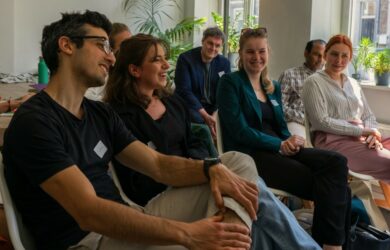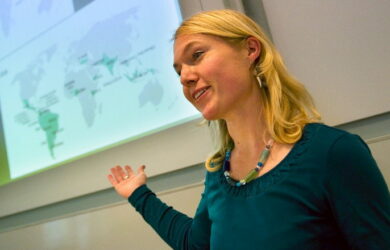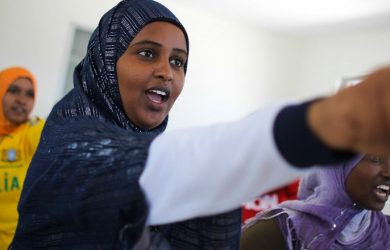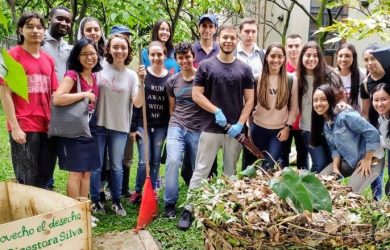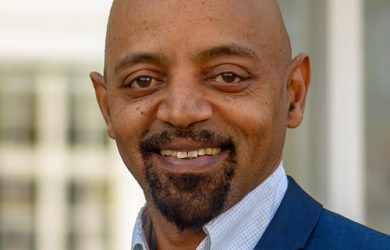- ABOUT US
- RESEARCH
- EDUCATION
- The Graduate School
- PhD Programme
- MSc Programmes
- Capacity Development
- News
- Design and Evaluation of Public Policies (DEPP)
- Design and Evaluation of Innovation Policies (DEIP)
- Evidence-Based Policy Research Methods (EPRM)
- Migration Management Diploma Programme (MMDP)
- Moving the Migration Policy Agenda Forward (MMPAF)
- Online Courses
- Short Courses (Masters)
- Tailor-made programmes
- UNU-MERIT, ITU Academy Training Centre
- Alumni
- Academic Funding
- NEWS
- EVENTS
- PUBLICATIONS
- LIBRARY
A recipe for change: Imagine, experiment, reflect
22 June 2023
Here’s what happened at the first Critical Policy Conference A guest post by Vincent Tadday, Global Studies student at Maastricht University To effect real change in policy and create social impact by way of re-imagination processes and dialogue, a new student-led initiative has emerged: the Critical Policy Lab. On Saturday 3 June 2023 in Maastricht, the first edition of the Lab’s Critical Policy Conference welcomed around 70 participants from UNU-MERIT and Maastricht University co...
Continue Reading →Climate technology and the global pandemic: Lessons and policy options
21 February 2022
A new paper co-authored by Prof. Luc Soete brings business and science perspectives to the most pressing global issues of our time. Set against the macro backdrops of climate change and the coronavirus pandemic, the authors investigate ‘technological sovereignty’ and ‘knowledge safety’ in Africa and Europe — particularly vis-à-vis China, the USA and the World Health Organization. They also analyse the sanctity of intellectual property rights, amid the ongoing tensio...
Continue Reading →From study to simulation to public policy reality: Why communication is key
20 January 2021
This year’s International Education Day, 24 January, occurs in the wake of a global pandemic that closed schools and universities worldwide, affecting 1.6 billion students in almost 200 countries — including some 120 Master’s students at UNU-MERIT in the Netherlands. Against this difficult backdrop, we raised our game to another level by hosting an online conference with real-life policymakers. The overall aim was to make our Master’s programme more engaging, more real an...
Continue Reading →Led by the science? Chatham House webinar on the complex relationship between policymaking and research
18 September 2020
Is it possible for politics and science to influence one another yet remain separate? To what extent should scientists be made accountable for the research that informs policy? What is the appropriate apparatus to mediate these issues? And what is the role of the media in shaping the public’s understanding and expectations of the links between science and policymaking? These were a few of the questions tackled in a Chatham House webinar on 11 September 2020, featuring Sir David King, former Chie...
Continue Reading →Hammer or nudge? New brief on international policy options for COVID-19
08 May 2020
Like so many other researchers sitting at home, watching the news about COVID-19, I have been impressed at how virologists, epidemiologists and other medical experts have caught the ears of national policymakers, business leaders and the general public. Suddenly, scientific facts and evidence bask in the trust of public opinion and fake news is once again ‘fake’ in the real sense of the word: unreliable, not to be trusted by anyone. Something climate experts have been dreaming of for decades, no...
Continue Reading →Political empowerment of women in Africa: Influence or number?
13 November 2019
In recent decades women’s political representation has significantly increased in Africa. From 2000 to 2018, the proportion of women parliamentarians almost doubled, and women’s representation in cabinet increased fivefold to 22% between 1980 and 2015. Unfortunately, the numbers do not necessarily imply influence....
Continue Reading →On women & power: From surface shine to core strength
22 July 2019
How many times have you rolled your eyes when someone said a country is progressive because half the parliament is made up of women? How much can this really tell us about gender equality and women’s participation in any particular country? Why does it even matter? As such a hot topic, I was excited to hear all about Catie Lott’s PhD dissertation, ‘Diamonds are a Woman’s Best Friend: Broadening Measures of Women’s Access to Formal Political Decision-Making’. Her doctorate looked at female policy...
Continue Reading →Green universities: Speeding up the pace of change for the 2030 Agenda
27 May 2019
In May 2019, the Intergovernmental science-policy Platform on Biodiversity and Ecosystem Services (IPBES) released a summary report for policymakers, “suggesting that around 1 million species already face extinction, many within decades, unless action is taken to reduce the intensity of drivers of biodiversity loss”. Highlighting the importance of biodiversity not only for our quality of life but for human existence per se, the report calls for transformative changes, i.e. “a fundamental, system...
Continue Reading →How I cleared the hurdle of designing a successful PhD proposal
29 January 2019
After over 15 years at the International Telecommunication Union (ITU), a UN specialised agency on information and communication technologies (ICTs), I felt it was the right time for me to design and execute a research project combining my professional experience, academic interests and certain gaps that I have witnessed in the field of ICTs and policymaking....
Continue Reading →How one short course helped me become more efficient, systematic & structured
28 November 2018
I had been searching for a programme that allowed me to combine my specific research interests with a rather busy work schedule. The blended format with in-person classes and distance learning modules worked very well for me, by providing a good balance between flexibility of schedule and the opportunity to meet in person the tutors and faculty staff during the first couple of weeks of the programme. This allowed me to develop a good working relationship with the tutors, while also meeting other...
Continue Reading →12
Archives
Contact
UNU-MERIT
Boschstraat 24
6211 AX Maastricht
The Netherlands
T: +31 43 388 44 00
Email: info@merit.unu.edu
Boschstraat 24
6211 AX Maastricht
The Netherlands
T: +31 43 388 44 00
Email: info@merit.unu.edu
Partner sites
Newsletters
© 2024 UNU-MERIT | Maastricht University


